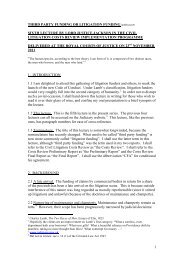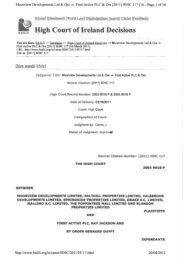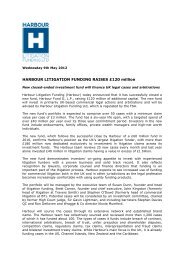Download PDF document - Harbour Litigation Funding
Download PDF document - Harbour Litigation Funding
Download PDF document - Harbour Litigation Funding
Create successful ePaper yourself
Turn your PDF publications into a flip-book with our unique Google optimized e-Paper software.
Kelly, Grossman & Flanagan, LLP v Quick Cash, Inc. :: March, 2012 :: New York Ot...<br />
http://law.justia.com/cases/new-york/other-courts/2012/2012-ny-slip-op-50560-u.html<br />
Page 1 of 6<br />
15/10/2012<br />
Justia.com Lawyer Directory Legal Answers Law Blogs Law more ▼<br />
Sign In<br />
Search for... in ---- 2012 Other Courts<br />
Search<br />
Justia > US Law > US Case Law > New York Case Law > New York Other Courts Decisions > March, 2012 > Kelly, Grossman & Flanagan, LLP v Quick<br />
Cash, Inc.<br />
NEW - Receive Justia's FREE Daily Newsletters of Opinion Summaries for the US Supreme Court, all US Federal Appellate<br />
Courts & the 50 US State Supreme Courts and Weekly Practice Area Opinion Summaries Newsletters. Subscribe Now<br />
Kelly, Grossman & Flanagan, LLP v Quick Cash, Inc.<br />
Share |<br />
Like 0<br />
[*1] Kelly, Grossman & Flanagan, LLP v Quick Cash, Inc. 2012 NY Slip Op 50560(U)<br />
Decided on March 29, 2012 Supreme Court, Suffolk County Pines, J. Published by New<br />
York State Law Reporting Bureau pursuant to Judiciary Law § 431. This opinion is<br />
uncorrected and will not be published in the printed Official Reports.<br />
Justia on<br />
+1,567<br />
Like 119,170 people like this.<br />
Decided on March 29, 2012<br />
Supreme Court, Suffolk County<br />
Kelly, Grossman & Flanagan, LLP, FLANAGAN & ASSOCIATES, PLLC, MURACA & KELLY,<br />
DENNIS KELLY, DAVID GROSSMAN, and SUZANNE FLANAGAN, Plaintiff,<br />
Daily Opinion Summaries<br />
Subscribe to Justia's FREE Daily<br />
Newsletter Opinion Summaries<br />
Subscribe Now<br />
against<br />
Quick Cash, Inc., CASEFUNDING,, INC., GUARDIAN ADVISORS LP I, GUARDIAN<br />
ADVISORS LP II and MONEY FOR LAWSUITS LP V, Defendants.<br />
04283-2011<br />
Attorney for Plaintiffs<br />
Isaac Zucker, Esq.<br />
Today on Verdict<br />
Eroticized Violence and Corporal<br />
Punishment in Public Schools: A<br />
Controversy Over Males Spanking<br />
Female Students, and Its<br />
Implications<br />
Justia guest columnist and<br />
Cornell Law Visiting Fellow<br />
Antonio Haynes comments on<br />
a recent controversy in which<br />
Anto<br />
nio<br />
Hay<br />
nes<br />
parents of two public school students<br />
did not object to their daughters<br />
undergoing corporal punishment<br />
(specifically, paddling), but did object<br />
to the punishment being carried out by<br />
men, rather than women.<br />
By Antonio Haynes<br />
Law Offices of Isaac Zucker, PLLC<br />
600 Old Country Road, Suite 321<br />
Garden City, New York 11530<br />
Attorney for Defendants<br />
Law Offices of Raul J. Sloezen, Esq.<br />
40 Walnut Street<br />
The Controversy Over a Teacher’s<br />
Criticism of a Student’s<br />
Romney/Ryan T-Shirt, and a<br />
Possible Solution for the Future<br />
Justia columnist and attorney<br />
Julie Hilden comments on the<br />
recent controversy over a<br />
Philadelphia public school<br />
geometry teacher's deriding<br />
student Samantha Pawlucy for wearing<br />
a Romney/Ryan T-shirt.<br />
By Julie Hilden<br />
Oakland, New Jersey 07436<br />
Emily Pines, J.<br />
ORDERED that the motion (001) by Defendants to dismiss the complaint, converted by<br />
the Court into a motion for summary judgment, is granted.<br />
ORDERED that Defendants' request for attorneys' fees is referred to a hearing on April<br />
23, 2012, at 10:00 a.m. before the undersigned.<br />
Ask a Lawyer<br />
Question:<br />
Please Ask Your Question Here.<br />
e.g., Do I need a Bankruptcy<br />
Lawyer?<br />
Ask Question<br />
About Legal Answers
Kelly, Grossman & Flanagan, LLP v Quick Cash, Inc. :: March, 2012 :: New York Ot...<br />
http://law.justia.com/cases/new-york/other-courts/2012/2012-ny-slip-op-50560-u.html<br />
Page 2 of 6<br />
15/10/2012<br />
In this action, Plaintiffs seek a judgment declaring that certain agreements between the<br />
parties [*2]are void as criminally usurious in violation of Penal Law §190.04. The record<br />
reveals that Plaintiffs, as partners in a law firm, executed certain <strong>document</strong>s which<br />
provided that Plaintiffs would repay to Defendants a principal amount plus a fee which<br />
Plaintiffs allege amounted to an annualized interest rate in excess of 40%.<br />
The complaint alleges that in May 2005, non-party Personal Injury <strong>Funding</strong> IV, LP, an<br />
affiliate and/or predecessor of one of the Defendants, extended a loan in the amount of<br />
$46,250 to plaintiff Muraca & Kelly, LLP. It alleges that, in October 2006, defendant<br />
Money For Lawsuits LP V extended a loan in the amount of $287,500 to plaintiff Muraca<br />
& Kelly, LLP; and the complaint alleges further that in December 2006, defendant<br />
Money For Lawsuits LP V extended a loan in the amount of $227,500 to plaintiff Muraca<br />
& Kelly, LLP. In April 2007, defendant Money For Lawsuits LP V extended a loan in the<br />
amount of $79,500 to plaintiff Muraca & Kelly, LLP. In September 2007, according to<br />
Plaintiffs, defendant Money For Lawsuits LP V extended a loan in the amount of $23,000<br />
to plaintiff Muraca & Kelly, LLP. Plaintiffs allege that each and every one of the loans<br />
provided for the repayment of the principal loan plus a fee at an interest rate in excess<br />
of 40%. Plaintiffs also allege that they have repaid defendants in excess of one million<br />
dollars.<br />
Plaintiffs contend that each and every payment they received from the Defendants was<br />
a loan and, therefore, subject to Criminal Usury laws under NY Penal Law §190.04. In<br />
support of this contention, Plaintiffs rely on the language of the original client<br />
agreements, which set forth that the Plaintiffs are "the Borrower" and the various<br />
defendants "the Lender". There was never any doubt, according to Plaintiffs, that<br />
Defendants were "lending" money. It was only in August 2009, state Plaintiffs, when all<br />
the agreements were consolidated, that Defendants converted the word "loan" to the<br />
word "advance" in order to mask the obvious fact that Defendants were covering for the<br />
lending of funds at a criminally usurious rate.<br />
Connect with Justia<br />
RT @TechCrunch: San Francisco Proposes Revised<br />
Open Data Legislation, Plans to Hire Chief Data<br />
Officer http://t.co/IBtYahbx by @anthonyha<br />
Justia on Facebook<br />
Like<br />
119,170 people like Justia.<br />
David Mikel Domenick Michael Charles<br />
Facebook social plugin<br />
Find a Lawyer<br />
Legal Issue or Lawyer Name<br />
City, State<br />
Search<br />
Browse Lawyers<br />
Lawyers - Get Listed Now!<br />
Get a free full directory profile listing<br />
Support Free Law<br />
Plaintiffs further assert that these loans were never non-recourse loans, despite their<br />
"label", because the Defendants were not at risk. For example, if a judgment debtor<br />
were unable to pay a judgment entered in favor of one of Plaintiffs's clients in an<br />
underlying case, the individual Plaintiffs were still personally liable to Defendants. In<br />
addition, Defendants received their repayment without any reduction for Plaintiffs' costs<br />
or expenses. Moreover, if Plaintiffs were discharged as counsel and unable to find<br />
replacement counsel, Plaintiffs were required to find a new case to replace the collateral<br />
(i.e. former case ) or pay liquidated damages.<br />
The complaint further alleges that from December 2007 through February 2008<br />
Defendants extended loans to plaintiff Flanagan & Associates. In August 2009, Plaintiffs<br />
and Defendants executed an Addendum to all prior agreements which provided that<br />
plaintiff Kelly, Grossman & Flanagan, LLP would assume responsibility for all<br />
outstanding loans and would provide additional collateral to secure the outstanding<br />
loans. Plaintiffs allege that the Addendum required them to pay an interest rate in<br />
excess of 40% annually. The instant action seeking declaratory relief voiding the<br />
alleged loans was commenced. [*3]<br />
Defendants moved to dismiss the complaint pursuant to CPLR 3211(a)(7). By order<br />
dated November 23, 2011 (Pines, J.), this Court converted the motion into a summary<br />
judgment motion and directed the parties to file and serve supplemental affidavits and<br />
other available proof, if desired, on thirty days' notice.<br />
Kenneth Bradt avers in his personal affidavit that he is the President and CEO of<br />
defendants Quick Cash, Inc, Case <strong>Funding</strong>, Inc., and is a general partner in defendants<br />
Guardian Advisors LP I, Guardian Advisors LP II, and Money For Lawsuits LP V (Quick<br />
Cash Entities). He states that the principal purpose of the Quick Cash Entities is to<br />
advance money to attorneys and/or plaintiffs involved in litigation in either recourse<br />
loans or non-recourse advances. Bradt states that in a recourse loan, the attorneys<br />
grant a lien to the Quick Cash Entity against the attorneys' fees expected to be received<br />
on cases handled by the attorney/firm, and the attorney makes either monthly<br />
payments to the Quick Cash Entity or pays when each case settles and/or at the end of<br />
the term of the loan. Bradt avers however, that if the agreement is a non-recourse<br />
advance, the attorney assigns to the Quick Cash Entity a portion of their expected fee<br />
from the case or cases in which the attorney represented one or more of the parties,
Kelly, Grossman & Flanagan, LLP v Quick Cash, Inc. :: March, 2012 :: New York Ot...<br />
http://law.justia.com/cases/new-york/other-courts/2012/2012-ny-slip-op-50560-u.html<br />
Page 3 of 6<br />
15/10/2012<br />
and pays the Quick Cash Entity only as each case settles. If there is no recovery in the<br />
case, then no money is due the Quick Cash Entity.<br />
Bradt states all of the agreements at issue in this case were non-recourse advances,<br />
except for one contract dated February 29, 2007, which was subsequently converted to<br />
a non-recourse advance. At the time of the first advance made by Quick Cash to<br />
plaintiff Muraca & Kelly, in May 2005, it was agreed that Plaintiffs would provide their<br />
anticipated attorneys' fees recovered from three pending actions, and that Quick Cash<br />
would be paid only in the event of a recovery in those cases. It was also agreed that<br />
the obligation would increase at the rate of 3.5% compounded monthly. Plaintiffs Kelly<br />
and Grossman personally guaranteed the performance of this contract.<br />
Bradt states that in October 2006, November 2006, April 2007, September 2007,<br />
plaintiff Muraca & Kelly requested financing from Quick Cash. The parties agreed that<br />
these were non-recourse advances. Plaintiffs also paid a processing fee and an<br />
origination fee with each advance. Plaintiffs Kelly and Grossman personally guaranteed<br />
the performance of each contract. Muraca and Kelly agreed to assign their anticipated<br />
fees in 27 pending actions as collateral. It was further agreed that the obligation would<br />
increase at the rate of 3.99% compounded monthly.<br />
Bradt states that Flanagan & Associates obtained financing from Quick Cash in June<br />
2007 and pledged all of their anticipated fees in two pending actions as collateral.<br />
Flanagan & Associates paid a processing fee. It was agreed that this advance was to be<br />
non-recourse funding. In October 2007, Flanagan paid off this contract in full.<br />
Bradt further avers that in December 2007, plaintiffs Flanagan & Associates and Kelly &<br />
Grossman requested a second cash advance from Quick Cash and entered into three<br />
contracts on December 18, 2007. The Plaintiffs paid a processing fee. It was further<br />
agreed that these advances were to be non-recourse funding, and the obligation would<br />
increase at the rate of 40% compounded quarterly. The Plaintiffs agreed to provide<br />
periodic status updates on the cases held as collateral. [*4]Flanagan, Kelly, and<br />
Grossman personally guaranteed the performance of the contracts. A third cash<br />
advance made to Flanagan & Associates on December 20, 2007, reflected a true loan<br />
agreement with a maturity date of December 19, 2009. The Plaintiffs agreed to assign<br />
their anticipated fees from several pending actions and paid an application fee. Plaintiffs<br />
also agreed to provide periodic status updates regarding the cases held as collateral.<br />
Flanagan personally guaranteed the performance of the contract.<br />
In February 2008, plaintiffs Flanagan and Flanagan & Associates requested a fourth<br />
cash advance from Quick Cash. Flanagan & Associates pledged fees from specific<br />
pending actions as collateral and Quick Cash agreed to make the advance a recourse<br />
loan agreement. Flanagan & Associates agreed to pay off the loan made on December<br />
20, 2007, obtain an additional amount of funding, and pay an origination fee.<br />
In May 2009, plaintiff Kelly, Grossman & Flanagan, a newly formed partnership,<br />
requested funding from Quick Cash for advertising fees and agreed to continue to<br />
prosecute the cases provided by Muraca & Kelly and Flanagan & Associates.<br />
Bradt states that the Addendum was entered into by the parties on August 13, 2009, to<br />
modify some of the payment terms, wherein the Kelly & Grossman attorneys agreed to<br />
pay to Quick Cash 75% of the attorney fees and permitted retention of 25% of the<br />
attorney fees from the collateral. The anticipated attorneys' fees from sixteen pending<br />
actions were added to the collateral. In addition, a provision for liquidated damages was<br />
added in the amount of two times the payment obligation if a breach occurred. The<br />
Addendum converted the Flanagan recourse loan agreement dated February 29, 2008,<br />
into a non-recourse agreement, removed the requirement of Flanagan's personal<br />
guarantee, and deemed the Flanagan recourse loan agreement to be null and void.<br />
Bradt states that the actual amount that was paid to all the Plaintiffs plus fees and costs<br />
was one million two hundred thousand sis hundred sixty one dollars and thirteen cents<br />
($1,215,66.13). In contrast to the Plaintiffs' allegation that they have paid Defendants<br />
in excess of $1,000,000, Bradt avers that Quick Cash's records indicate that the actual<br />
amount received from the Kelly & Grossman attorneys was $451,136.27, and the<br />
amount received from Flanagan was $122,711.91. In addition, Bradt states that the<br />
Plaintiffs are in breach of the contracts, including not paying pursuant to the terms of
Kelly, Grossman & Flanagan, LLP v Quick Cash, Inc. :: March, 2012 :: New York Ot...<br />
http://law.justia.com/cases/new-york/other-courts/2012/2012-ny-slip-op-50560-u.html<br />
Page 4 of 6<br />
15/10/2012<br />
the agreements, not providing accurate up to date status of the collateral cases and<br />
refusing to provide the settlement <strong>document</strong>s as required by the contracts.<br />
A party moving for summary judgment must make a prima facie showing of entitlement<br />
as a matter of law, offering sufficient evidence to demonstrate the absence of any<br />
material issues of fact. Winegrad v New York Univ. Med. Ctr., 64 NY2d 851, 487 NYS2d<br />
316 (1985); Zuckerman v New York, 49 NY2d 557, 427 NYS2d 595 (1980). Of course,<br />
summary judgment is a drastic remedy and should not be granted where there is any<br />
doubt as to the existence of a triable issue, Stewart Title Ins. Co. v Equitable Land<br />
Servs., 207 AD2d 880, 616 NYS2d 650 (2d Dept 1994), but once a prima facie showing<br />
has been made, the burden shifts to the party opposing the motion to produce<br />
evidentiary proof in admissible form sufficient to establish material issues of fact which<br />
require a [*5]trial of the action. Alvarez v Prospect Hosp., 68 NY2d 320, 508 NYS2d<br />
923 (1986).<br />
"[I]t is well settled that when parties set down their agreement in a clear, complete<br />
<strong>document</strong>, their writing should . . . be enforced according to its terms.'" South Rd.<br />
Assoc., LLC v International Bus. Machs. Corp., 4 NY3d 272, 277, 793 NYS2d 835<br />
(2005), quoting Vermont Teddy Bear Co. v 538 Madison Realty Co., 1 NY3d 470, 475,<br />
775 NYS2d 765 (2004). When interpreting a contract, "the court should arrive at a<br />
construction which will give fair meaning to all of the language employed by the parties<br />
to reach a practical interpretation of the expressions of the parties so that their<br />
reasonable expectation will be realized." Herzfeld v Herzfeld,50 AD3d 851, 857 NYS2d<br />
170 (2d Dept 2008). If the terms of a written contract are clear and unambiguous,<br />
intent of the parties must be found within the four corners of the contract. Correnti v<br />
Allstate Props., LLC, 38 AD3d 588, 832 NYS2d 594 (2d Dept 2007). Extrinsic evidence<br />
of the parties' intent may be considered only if the agreement is ambiguous, which is<br />
an issue of law for the courts to decide. Innophos, Inc. v Rhodia, S.A., 10 NY3d 25, 852<br />
NYS2d 820 (2008). A contract is unambiguous if the language it uses has a definite and<br />
precise meaning, unattended by the danger of misconception in the purport of the<br />
agreement itself and there is no reasonable basis of difference of opinion. Greenfield v<br />
Philles Records, Inc., 98 NY2d 562, 750 NYS2d 565 (2002).<br />
In order to constitute a transaction subject to the Penal Code § 190.40, prohibiting<br />
criminal usury, such transaction must constitute a loan. Donatelli v Siskind, 170 AD2d<br />
433, 565 NYS2d 264 (2d Dep't 1991). Usury laws do not apply to investments (GOL § 5<br />
-501[2]). Where a transaction involves interest to be paid based upon a contingency<br />
which is in the control of the debtor, usury will not apply. Summer v People, 29 NY 337<br />
(1864). In order to determine whether a particular transaction qualifies as a loan<br />
subject to a criminal usury prohibitions, courts look to the purpose of the transaction;<br />
i.e., to lend money at a usurious rate dictated by the lender. Donatelli v Siskind, 170<br />
AD2d 433, 565, NYS2d 224 (2d Dep't 1991). Thus, the purpose of a transaction is<br />
determined by its true character, under all circumstances, rather than by its title.<br />
Vjuetta v Euro-Quest Corp., 29 AD3d 895 (2d Dep't 2006).<br />
The contracts dated May 6, 2005, October 10, 2006, December 7, 2006, April 9, 2007,<br />
June 5, 2007, and September 9, 2007 provide at paragraph 4.7 or 4.8 :<br />
"Attorney represents and warrants that Attorney fully understands that the Advance<br />
made hereunder is not a recourse loan, but a non-recourse financial transaction<br />
pursuant to which Investor's funds are at full risk."<br />
The Addendum to the Agreements by and among Quick Cash, Money For Lawsuits and<br />
Casefunding and affiliated entities, Muraca & Kelly, Dennis Kelly, Esq., David Grossman,<br />
Esq., Flanagan & Associates, PLLC, Suzanne Flanagan, Esq., and Kelly Grossman &<br />
Flanagan, LLP, dated August 13, 2009, page 8, provides, in part:<br />
* * * Upon the signing of this Addendum, the Flanagan Recourse Agreement(s) shall be<br />
deemed null and void and the amounts due pursuant to those recourse agreement(s)<br />
are now incorporated in full [*6]herein as non-recourse.<br />
Defendants have demonstrated their prima facie entitlement to judgment as a matter of<br />
law by proving that the disputed contracts are non-recourse advance agreements. In<br />
support of their motion, defendants contend that none of the contracts that exist as of
Kelly, Grossman & Flanagan, LLP v Quick Cash, Inc. :: March, 2012 :: New York Ot...<br />
http://law.justia.com/cases/new-york/other-courts/2012/2012-ny-slip-op-50560-u.html<br />
Page 5 of 6<br />
15/10/2012<br />
today are true loan <strong>document</strong>s and they are not subject to the usury statutes. Copies of<br />
the alleged loan <strong>document</strong>s executed between the parties all so demonstrate.<br />
Plaintiffs' contention that the language in the contacts was ambiguous, that "borrower"<br />
and "lender," automatically qualify the contracts as loans and that the origination fees<br />
and processing fees, typically charged in connection with loans, qualify the contracts as<br />
loans is unpersuasive. In fact, the Defendants were always at risk of no recourse<br />
whenever one of the underlying cases went to trial and resulted in no recovery. Such<br />
circumstances simply cannot be stated to constitute a "loan". The Court finds that the<br />
language in the contracts was not ambiguous, and the intent of the parties is clear, as<br />
demonstrated by the plaintiffs' express acknowledgment, as sophisticated attorneys, in<br />
each contract that a non-recourse agreement for a cash advance was entered into and<br />
not a loan.<br />
The Court finds the holding in Matter of Strategies, LLC v. Ferreira (28 Misc 3d 1205[A],<br />
2010 NY Slip Op 51159[U][2010]), to be persuasive. In that proceeding to confirm an<br />
arbitration award, the petitioner was a limited liability company that provided funding<br />
for a legal action brought by respondent Baltazar Ferreira, in which he was represented<br />
by respondent, the law firm of Jeffrey Lessoff. The funding, approximately $120,000,<br />
was a non-recourse advance pursuant to two agreements between the parties. The<br />
respondents agreed to pay petitioner from the proceeds received in the underlying<br />
action. The underlying action was subsequently settled for $250,000 and respondents<br />
began collecting the settlement proceeds. After respondents failed to pay petitioner its<br />
share of the settlement proceeds, petitioner initiated arbitration proceedings pursuant<br />
to the agreements to collect its share. An arbitrator issued an award in favor of<br />
petitioner holding respondents jointly and severally liable for approximately $120,000,<br />
plus 2.99% interest per month compounded monthly in accordance with the contract,<br />
plus additional simple interest and attorneys' and arbitration fees. In granting<br />
petitioner's motion to confirm the award of the arbitrator, the Supreme Court, New York<br />
County (Hunter, J.) rejected the respondents claim that the interest rate that was part<br />
of the arbitration award amounted to usury. In holding that the defense of usury was<br />
not applicable, the Court stated:<br />
The concept of usury applies to loans, which are typically paid at a fixed or variable rate<br />
over a term. The instant transaction, by contrast, is an ownership interest in proceeds<br />
for a claim, contingent on the actual existence of any proceeds, Had respondents been<br />
unsuccessful in negotiating a settlement or winning a judgment, petitioner would have<br />
no contractual right to payment. Thus, usury does not apply to the instant case. (See<br />
O'Farrell v. Martin, 292 NYS 581 [City Ct. NY 1936] [holding "[W]hen payment or<br />
enforcement rests on a contingency, the agreement is valid though it provides for a<br />
return in excess of the legal rate of interest."]). [*7]<br />
Similarly, here, the transactions between the parties create ownership interests in<br />
proceeds of claims, contingent on the actual existence of any proceeds. Plaintiffs would<br />
have no contractual right to payment had Defendants been unsuccessful in negotiating<br />
settlements or winning judgments in the underlying actions. Therefore, under the<br />
circumstances, usury does not apply and the Defendants' motion for summary<br />
judgment dismissing Plaintiffs' complaint is granted.<br />
Defendants' request for an award of its attorneys' fees is referred to a conference on<br />
April 23, 2012, at 10:00 a.m. before the undersigned.<br />
This constitutes the DECISION and ORDER of the Court.<br />
Dated: March 29, 2012<br />
Riverhead, New York<br />
EMILY PINES<br />
J. S. C.
Kelly, Grossman & Flanagan, LLP v Quick Cash, Inc. :: March, 2012 :: New York Ot...<br />
http://law.justia.com/cases/new-york/other-courts/2012/2012-ny-slip-op-50560-u.html<br />
Page 6 of 6<br />
15/10/2012<br />
Copyright © Justia :: Company :: Terms of Service :: Privacy Policy :: Contact Us


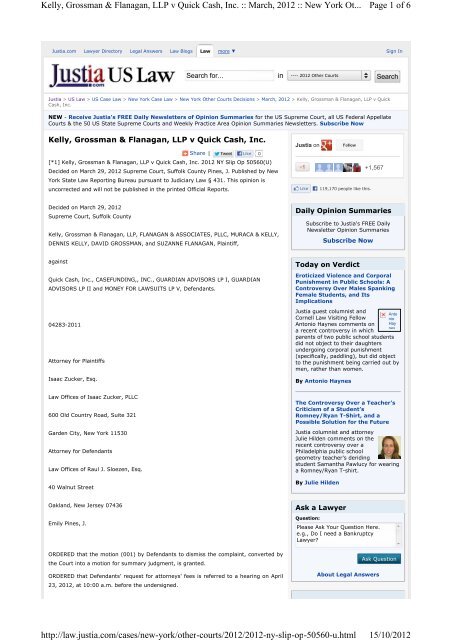
![Neutral Citation Number: [2010] EWHC 941 (QB) - Harbour ...](https://img.yumpu.com/47188668/1/190x245/neutral-citation-number-2010-ewhc-941-qb-harbour-.jpg?quality=85)
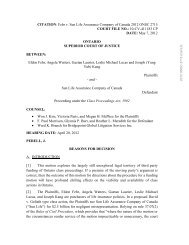
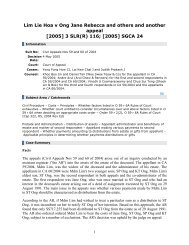
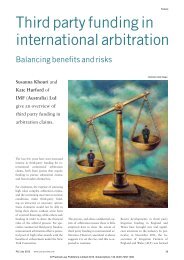
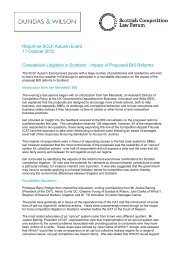
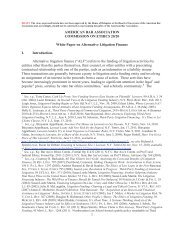
![Hall v Poolman [2009] - Harbour Litigation Funding](https://img.yumpu.com/37488843/1/190x245/hall-v-poolman-2009-harbour-litigation-funding.jpg?quality=85)
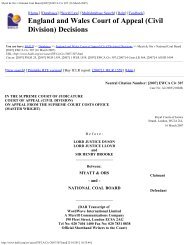

![[2013] SGHC 135 - Singapore Law Watch](https://img.yumpu.com/37488807/1/184x260/2013-sghc-135-singapore-law-watch.jpg?quality=85)
